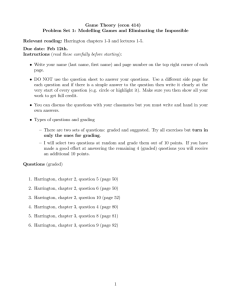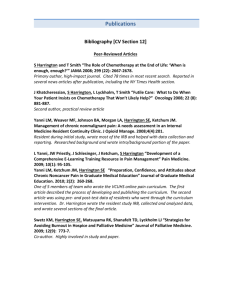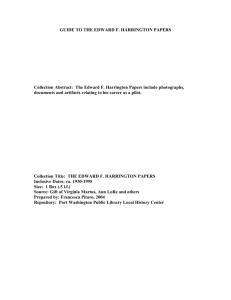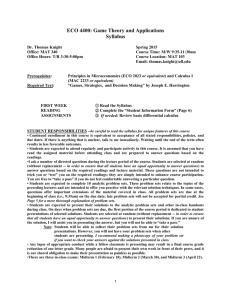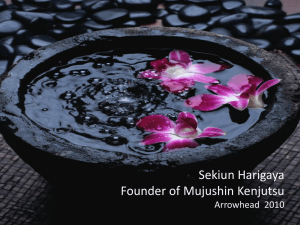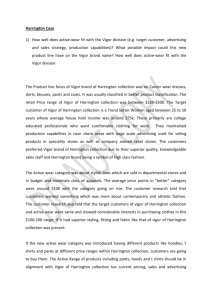PP 02 James Harrington Hobbes
advertisement
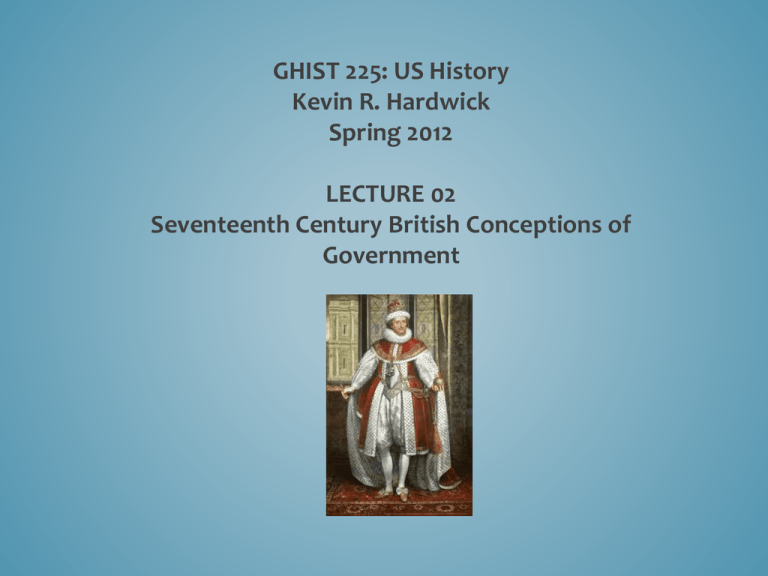
GHIST 225: US History Kevin R. Hardwick Spring 2012 LECTURE 02 Seventeenth Century British Conceptions of Government Part 1: Absolute Monarchy Part 2: Two Thinkers James Harrington Thomas Hobbes King James Stuart I of England, 1603-1635 Speech to Parliament, 1610: In the scriptures kings are called gods, and so their powers after a certain relation compared to the divine power. Kings are also compared to fathers of families, for the king is truly . . . the politic father of his people. (CAPCT, Vol. 1, p. 4) Sir Robert Filmer, Patriarchia, 1680 Patriarchalism: the simile that a king’s government of his realm is like a father and husband’s government of his family: "Adam was the father, king and lord over his family: a son, a subject, and a servant or a slave were one and the same thing at first.“ John Locke wrote his First and Second Treatises on Government in order to explain why Filmer is wrong. Natural Rights and Natural Law God has created human beings in His image, and thus all human beings possess a certain divine dignity that must be respected. God has created the world we live in, in such a way that certain things are naturally true—are true by nature. Natural law amounts to what we can know about the world, and infer from it and from Revelation how God wants us to live. Note the difference between Natural law and “Positive” law—“Positive” law is the law promulgated by human legislatures. It is “artificial” in the sense that it results from human institutions, not from nature. “Natural”—as God made it “Manmade”—humanities’ additions (or subtractions) from what is natural 1649: The office of a king in this nation . . . is unnecessary, burdensome, and dangerous to the liberty, safety, and public interest of the people. Resolved, that England is: a commonwealth and Free state . . . governed . . . by the supreme authority of this nation, the representatives of the people in Parliament . . . without any king or House of Lords. The central question that England then confronted: how do you make a government work, if there is no King? James Harrington, Oceana, 1656 Government, according to the ancients, . . . is of three kinds: the government of one man, or of the better sort, or of the whole people, which, by their more learned names, are called monarchy, aristocracy, and democracy. These they hold, through their proneness to degenerate, to be all evil. The corruption of monarchy is called tyranny; that of aristocracy, oligarchy, and that of democracy, anarchy. (CAPCT, Vol. 1, p. 24) James Harrington, Oceana, 1656 “Mixed Government” But legislators, having found these three governments at the best to be naught, have invented another, consisting of a mixture of them all, which only is good. James Harrington, Oceana, 1656 All functional governments must possess some means of using force. We call this today the “Police Power” of the state. Harrington called it the “Power of the sword”: The hand which holds this sword is the militia of the whole nation; and the militia of the whole nation is either an army in the field, or ready for the field upon occasion. But the army is a beast that has a great belly, and must be fed: wherefore this will come to what pastures you have, and what pastures you have will come from the balance of property, without which the public sword is but a name or mere spitfrog. (CAPCT, Vol. 1, p. 25) From the OED (you have access to this excellent tool via the JMU Libraries web portal) † spit-frog, n. Etymology: < spit v.1 Obs. rare.Thesaurus » In contemptuous use: A sword. 1615 Fennor Defence in J. Taylor Wks. (1630) ii. 152/2, I would not see thy spightfull Spit-frog drawne. 1656 J. Harrington Common-wealth of Oceana 6 What pastures you have will come unto the ballance of propriety, without which the publick sword is but a name or meer spit-frog. Thomas Hobbes, Leviathan, 1651 NATURE hath made men so equal in the faculties of body and mind as that, though there be found one man sometimes manifestly stronger in body or of quicker mind than another, yet when all is reckoned together the difference between man and man is not so considerable as that one man can thereupon claim to himself any benefit to which another may not pretend as well as he. For as to the strength of body, the weakest has strength enough to kill the strongest, either by secret machination or by confederacy with others that are in the same danger with himself. If any two men desire the same thing, which nevertheless they cannot both enjoy, they become enemies; and in the way to their end (which is principally their own conservation, and sometimes their delectation only) endeavour to destroy or subdue one another. Hereby it is manifest that during the time men live without a common power to keep them all in awe, they are in that condition which is called war; and such a war as is of every man against every man.

